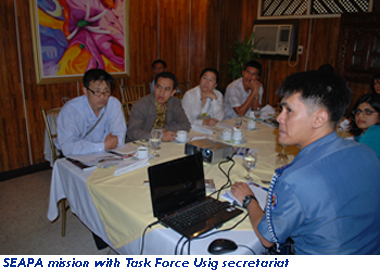A SOUTHEAST Asian journalists’ mission has called on the Arroyo government to intensify efforts to prosecute the killers of journalists and arrest the suspected masterminds in the 2005 killing of Mindanao journalist Marlene Garcia Esperat.
“We are alarmed by the continuing killing of media workers in the Philippines and the inadequate measures the government is taking to stop them,” the mission organized by the Bangkok-based Southeast Asia Press Alliance (SEAPA) said as it concluded its visit to Manila Tuesday.
Citing the unresolved journalist murders and a possible increase in the number of journalist killings as next year’s presidential election nears, it called on President Gloria Arroyo to take the steps necessary to stop the killings.
 “A halt to the killing of journalists as well as political dissenters would be one the enduring legacies you can leave the Filipino people as your term ends,” the mission reminded Arroyo.
“A halt to the killing of journalists as well as political dissenters would be one the enduring legacies you can leave the Filipino people as your term ends,” the mission reminded Arroyo.
An average of five journalists have been killed in the line of duty in the Philippines since Arroyo came to power in 2001. The number of journalists killed since democracy was restored in the country in 1986 stood at 78 as of end of February.
The SEAPA mission, which visited the Philippines from March 21 to 24 to mark the fourth anniversary the killing of Esperat, welcomed the creation of “tracker teams” in the Philippine National Police, but said the Arroyo administration could still do much more by tracking down and arresting suspected masterminds.
The tracker teams are charged with speedily locating and arresting suspected killers of journalists.
“One of the reasons we came to the Philippines on the eve of the fourth death anniversary of Marlene Esperat was because we believe that the culture of impunity that is deeply rooted in the Philippines could be replicated in other countries in the region unless there is a common effort to dismantle it in the Philippines,” the mission said. “We note an increase in the violence against journalists and media workers in Malaysia and Thailand including browbeating, harassment and mob attacks on individual journalists; surrounding media premises; and the killing of journalists in addition to the use of legal sanctions to silence the media and suppress on-line free expression in 2008.”
SEAPA described “the culture of impunity” as the seeming immunity from prosecution and punishment of most of the killers and suspects in the killing of journalists. Only two out of the 78 cases of journalists killed while on duty since 1986 have been partly resolved: The killers have been tried and convicted but no mastermind has been prosecuted.
A day earlier, the New York-based Committee to Protect Journalists released its Global Impunity Index in which the Philippines ranks sixth out of 14 countires that made it to the list.
The SEAPA mission was composed of Doung Hak Samrithy, vice president of the Cambodian Association for the Protection of Journalists; Jajang Jalamudin, secretary general of the Alliance of Independence Journalists, Indonesia; Pradit Ruangdit, secretary general of the Thai Journalists Association; V Gayathry, executive director of Center for Independent Journalists, Malaysia; and Kulachada Chaipipat, campaign and advocacy officer, Southeast Asian Press Alliance Bangkok, Thailand, the Head of the Mission.